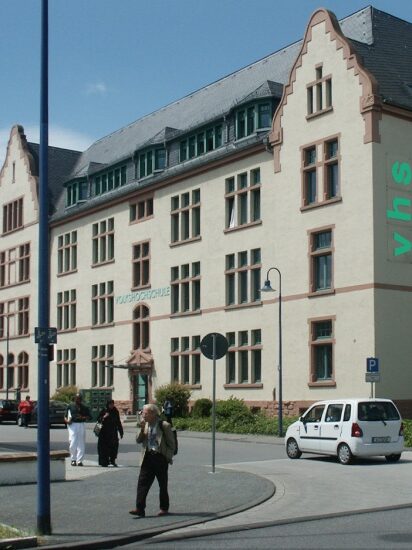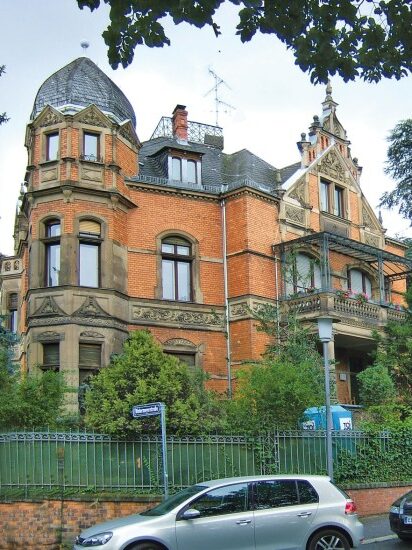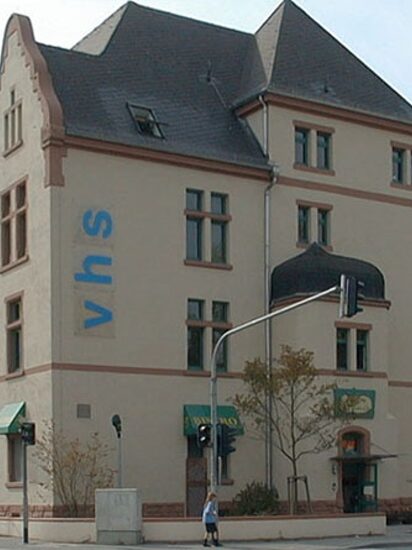Adult Education Center Wiesbaden
The Wiesbaden Adult Education Center was founded in 1921. Even then, it was aimed at all social classes and met with steadily growing interest. However, it was closed by the National Socialists in 1933. It resumed its work a second time in 1946.
Adult education centers in Germany were mostly only established at the beginning of the Weimar Republic. The majority of them were gathering points for the democratic forces of the first liberal state in German history. Article 148 of the Reich Constitution of 1919 expressly stipulated that the promotion of popular education and, in particular, adult education centers was the responsibility of the Reich, the federal states and the municipalities. However, the new adult and further education institutions were by no means universities. Rather, they aimed to contribute to the active and responsible participation of the population in the newly created "democratic people's state" by raising the level of general education. They brought together two democratic and enlightened traditions, both of which can be traced back at least as far as the revolution of 1848/49, namely the educational ideas and qualification efforts of the liberal middle classes and those of the workers' movement.
The Wiesbaden Adult Education Center (VHS) was officially opened on January 9, 1921 in the town hall (Rathaus, new). Bourgeois circles, including representatives of the Volksbildungsverein and the Philologenverband, were also involved in its founding, as were those of the labor movement. Its first sponsors included the Henkell sparkling wine producer (Henkell & Co., Sektkellerei) and Maschinenfabrik Wiesbaden. An office was set up in Lyzeum II - now Elly-Heuss-Schule - on what was then Boseplatz, now Platz der Deutschen Einheit. The auditorium and classrooms of this school could also be used at the time.
The educational program was aimed at "spiritual seekers from all walks of life". A statistic from the founding year shows that these were actually reached. The "general public cultivation of the mind for adults" was defined as the fundamental goal of the educational efforts. The various working groups of the VHS saw themselves "as basic units of the democratic people's state."
In the following economically dramatic years, courses for the unemployed in particular became increasingly important. At the same time, public funding continued to decline until it was finally discontinued in 1931. Thanks to generous donations from private individuals and the fact that the teachers waived their fees, the unemployed and other people in need were still able to attend the courses free of charge or at low cost.
In 1933, the VHS was dissolved by the National Socialists. Johannes Maaß, previously its managing director and director of studies as well as chairman of the sponsoring association, the Volkshochschulbund Wiesbaden und Umgebung, which had been founded in 1920, was removed from office. He was also dismissed as an elementary school teacher and placed under police supervision. In 1944, he was arrested and subsequently sent to Dachau concentration camp, from which he was only released after several months.
After Maaß was appointed head of the school and culture department in agreement with the American military government in 1945, he was able to work as a full-time city councillor for schools, public education and sport from the following year. On June 2, 1946, he was able to open the VHS for the second time, together with Franz Götting, the director of the Nassau State Library. The latter was then to act as chairman of the adult education institution from 1956 to 1968, after Helmut Schoppa had previously held this position. The sponsoring association was also re-established in 1946.
After Erich Tschirn had initially been the full-time managing director of the new VHS, followed by Erich Mende in 1947, Eberhard Stephan became its full-time director in 1953, incidentally with the official title of Volkshochschule director in 1965. He was succeeded in 1980 by Horst Castendyk.
In 1956, the then mayor Georg Buch, who saw himself throughout his life as a "student" of Maaß, who was two decades his senior, allocated the VHS the building at Dotzheimer Straße 3 as a "temporary home". Otherwise, the 1950s and 1960s were characterized by renewed existential crises caused by unsecured municipal subsidies. This only changed after 1970 with the passing of the Hessian Adult Education Act, which made the operation of a VHS a compulsory municipal task and significantly increased state funding for this. This made it possible to hire additional full-time staff and to divide the organization and the educational offerings into departments. However, it was not possible to prevent the city and state from drastically reducing their subsidies again later on. In 2001/2006, the Hessian Law on Continuing Education and Lifelong Learning (HWBG) provided a new foundation for VHS work.
In 1973, Villa Schnitzler at Biebricher Allee 42, which had been transferred to the city in the will with the proviso that it be used by the VHS, was also established as a cultural and teaching center.
From 1989 to 2016, Hartmut Boger headed the VHS, which is now divided into five departments: Society, Career, Health and Nature, Languages and Culture. In 1992, the Academy for the Elderly was founded, a city-wide cooperation network of over 30 institutions for the education of the elderly under the umbrella of the VHS, which is the only one of its kind in Germany.
The intercultural project Tandem Deutsch-International, which emerged from a VHS seminar in 1989, has since been supported by the VHS together with the city and the Protestant (Evangelische Stadtakademie Wiesbaden) and Catholic adult education institutions.
From 1968 to 1992, Günther Böhme, who has been a lecturer in philosophy at the VHS since 1953, was the chairman of the board of the sponsoring association. He was succeeded by Margarethe Goldmann, Head of Education and Culture in the state capital from 1985 to 1992, who chaired the association until October 2009. Due to a change in the statutes made necessary by the HWBG, Rita Thies, City Councillor for Culture, Building Construction and the Environment, then became Chairperson by virtue of her office. Rose-Lore Scholz, City Councillor for Schools, Culture and Integration, has held this office since 2011. The state capital of Wiesbaden is a member of the VHS as a corporate body.
On the occasion of the double anniversary celebrated in 1996 - 75 years since the VHS was founded and 50 years since it was re-established - Lord Mayor Achim Exner offered the institution the prospect of two former barracks buildings on Camp Lindsey as its new home. After the buildings at Alcide-de-Gasperi-Strasse 4 and 5 had been renovated and functionally converted by the Stadtentwicklungsgesellschaft Wiesbaden (SEG), Exner was able to officially hand them over on September 18, 1997, his last day in office.
The VHS currently relies on over 500 teachers, all of whom are experts in their respective fields and regularly take part in further education courses themselves. With around 30,000 participants in over 2,000 educational events, a financial volume of around five million euros per year and over 50 cooperation partners, the VHS is an indispensable educational and cultural institution for Wiesbaden and the surrounding area. Together with the five adult education centres in Klarenthal, Bierstadt, Schierstein, Nordenstadt-Erbenheim-Delkenheim and AKK, it not only performs the compulsory municipal task of public adult education on behalf of the state capital of Wiesbaden, but also makes a significant contribution to popularizing and stabilizing democratic thinking and action. The Freiwilligenzentrum Wiesbaden e.V., which was founded in 1999 and is closely linked to the VHS, is also logically based at the VHS.
Dr. Philipp Salamon-Menger was Director of the Wiesbaden Adult Education Center from 2016 to March 2020. During the difficult transition period caused by coronavirus, Hartmut Boger once again took over as interim director of the VHS. Since mid-May 2020, Dr. Stephanie Dreyfürst has been the first woman in the history of VHS Wiesbaden to become the new director.
The Wiesbaden City Archive houses the files of the Wiesbaden Adult Education Center.
Literature
Education for all! Cultural life and educational aspirations in Wiesbaden since 1800, Wiesbaden 2000.


